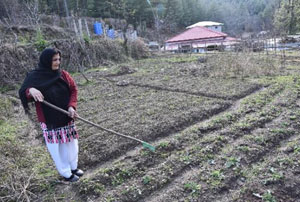The picturesque village Cheruty lies in the peripheries of district Rawalakot, Azad Jammu and Kashmir. It sits near a hilltop surrounded by towering ferns trees. Local economy is nearly non-existent as a large portion of locals’ income come in the form of foreign remittances from family members abroad, while some seek greener pastures in other cities. A few locals work as electricians or plumbers in and around the village. The women are mostly vulnerable and rely on their families for every aspect of their lives. They are mainly confined to doing household chores and rearing children.
Gulnaz Fatima, a 45-year-old mother of five, moved to Cheruty when she got married. Her spouse, a daily wage electrician, had a meagre income due to limited work opportunities. His failing health only added to the family’s financial and emotional woes.

In July 2019, Women Welfare Organization (WWO) initiated its intervention called Transforming Vulnerabilities to Proficiency with Vegetable Farming supported by the USAID Ambassador’s Fund Grant Program (AFGP). The main aim of this intervention was to financially empower women and improve their living conditions.
Under this intervention, Fatima was nominated for an eight-day training that focused on vegetable farming. It built capacities and sensitized 130 women from Rawalakot on the economic benefits of growing vegetables, the technological solutions available for such agriculture, tunnel farming techniques, compost fertilizer preparation and its use, and developing market connections.
“I had lost all hope and just like so many others in my village, I had planned on leaving for Rawalpindi to look for other avenues of income. Initially, I was not very motivated to participate in the program but after attending its first session, I felt this could transform my life by linking me with economic opportunities,” said Gulnaz. She completed her training on August 2, 2019, and immediately put her newly acquired skills to utility on a four-kanal land where she cultivated spinach, chilies, radishes, carrots, pumpkins, and cucumbers. The result was astounding. A return of Rs. 20,000 per month was something she could have never imagined.

Her success further motivated her to expand her product range. She started making pickles from carrots and cucumbers that she had grown herself, resulting in an additional income of Rs. 5,000. She also prepared compost fertilizer and sold it for Rs. 12,000. “This program has transformed my life,” says Fatima wearing a content smile. “I feel empowered after undergoing this training, and I am hopeful that I will be able to provide a better future for my children.” To increase the market connections of the project’s women beneficiaries, Jazz Bakhabar Kissan, an initiative of Pakistan’s leading cellular service provider, expressed its support through a letter of appreciation.
This service is dedicated to farmers, informing them about the latest market rates, weather forecasts, agricultural advisory, soil-testing facility, and all agriculture-related news and government schemes. It also allows farmers to sell their produce through the service’s e-commerce platform, “Farm to Home.”




















